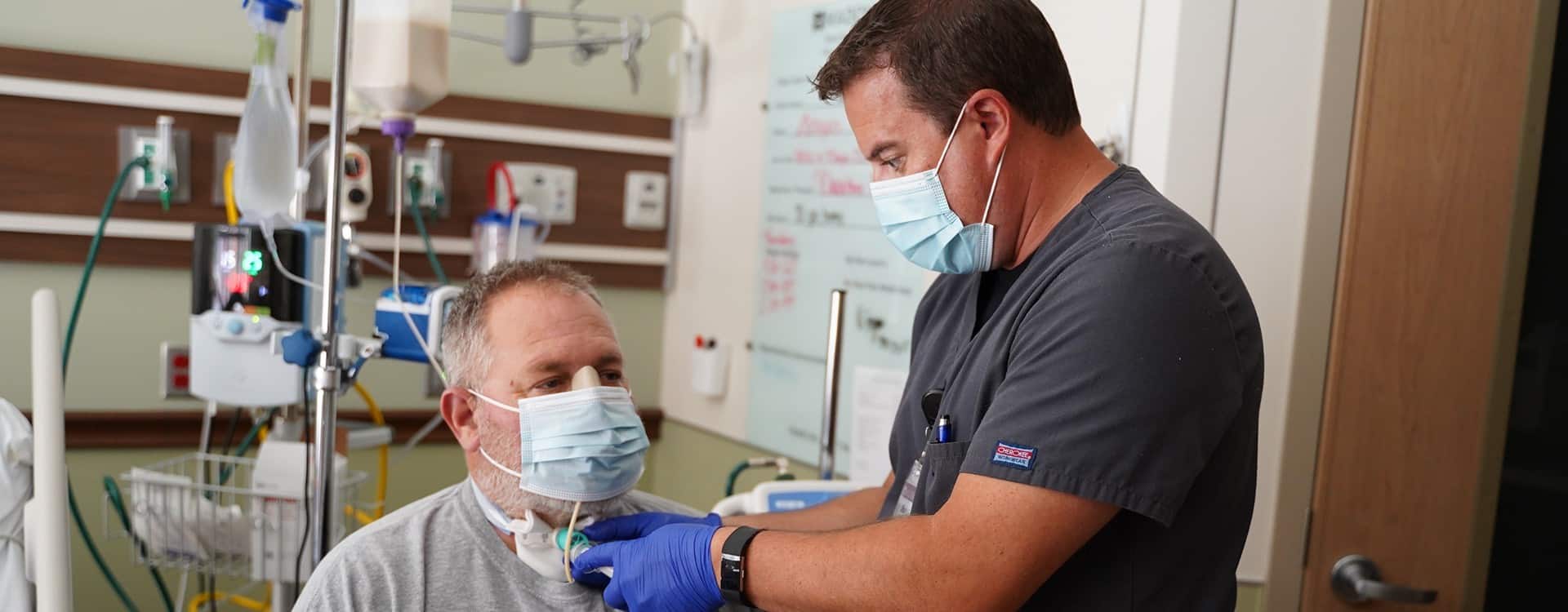At Madonna Rehabilitation Hospitals, our care teams see patients with a variety of serious injuries or illnesses. These patients participate in an intense therapy schedule, usually consisting of several hours of physical, occupational, speech and recreation therapy. When a patient comes in with a tracheostomy or ventilator or has a chronic lung disease, they also participate in respiratory therapy. Madonna’s Respiratory Therapist Dustin Shepler, BA, RRT, describes it as a “behind-the-scenes” job, but it is central to Madonna’s mission. National Respiratory Care Week, Oct. 24-30, is a chance to showcase the important work of our dedicated respiratory therapy team.
Dustin has been a respiratory therapist (RT) for 16 years. He has experience in emergency medicine, adult critical care, neonatal intensive care and even critical care air transport.
“After starting a family and moving to Omaha for my wife’s job, I wanted to slow down and find a position with more regular hours where I could concentrate more on patient/family education,” Dustin said. “I found a home here at Madonna.”
As a respiratory therapist at Madonna, Dustin and his colleagues on the Omaha and Lincoln campuses are equipped to manage patients with chronic lung diseases like asthma, COPD, chronic bronchitis and cystic fibrosis, as well as patients who come to Madonna on a ventilator or with a tracheostomy as the result of a serious injury. Last year, Madonna RTs cared for an average of 26 ventilator-dependent patients every day and helped 76 patients completely wean from the ventilator. In total, RT staff performed over 195,000 patient clinical interventions, including vent and trach weaning trials, breathing treatments and other diagnostic and monitoring procedures and assessments to promote patient independence and lung health.
Each patient presents with a unique set of symptoms to be managed, and our dedicated RTs are highly skilled at adapting to meet the needs of each person. When the COVID-19 pandemic started, Madonna’s therapists began seeing more post-COVID patients who spent weeks on a ventilator with no recollection of their time in the hospital. As a result, these patients arrive at Madonna very weak, and many continue to have high supplemental oxygen needs. Weaning these oxygen needs plays a big part in the rehabilitation process.
“A lot of our patients come to us with respiratory complications that could affect them for the rest of their lives,” Dustin said. “We have the opportunity, as respiratory therapists, to make that transition easier for these patients and family members by educating them and preparing them for a successful transition to home.”
Educating patients and families is what Dustin says he loves most about his job. With a longer average length of stay than acute care hospitals, he says he appreciates the chance to spend extra time with families and answer all their questions. He also enjoys working with other members of the interdisciplinary team to help patients achieve the highest level of independence possible.
“I’ve never worked at a facility where the interdisciplinary collaboration between professions is so strong,” Dustin said. “Working so closely with the speech therapists, occupational therapists, physical therapists, nurses, physicians, social workers and case managers not only makes this a great place to work but also a successful one.”





